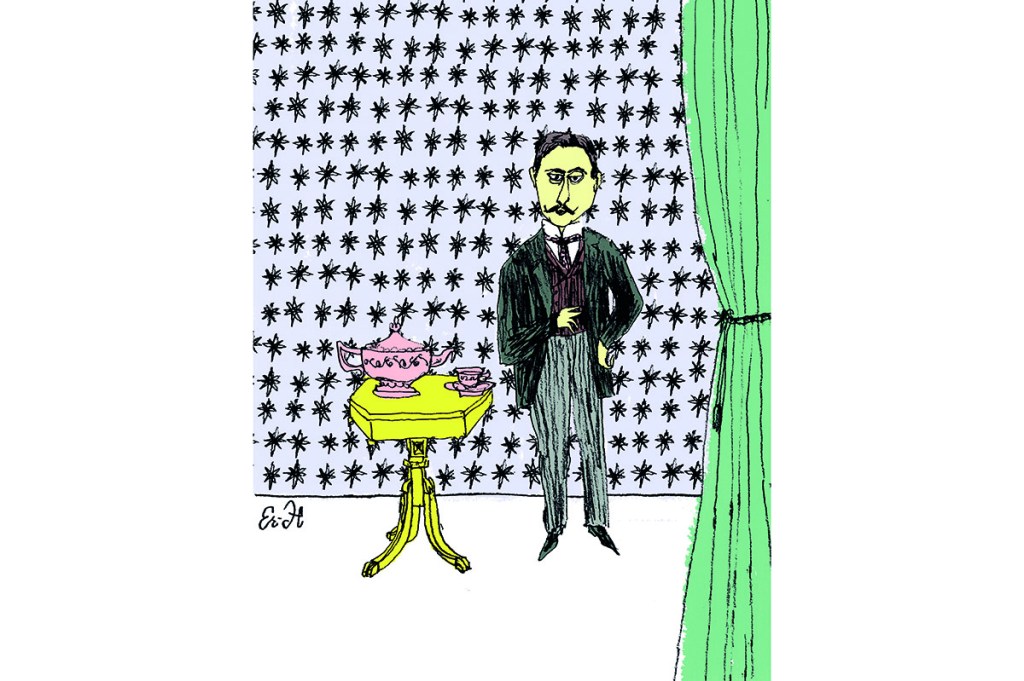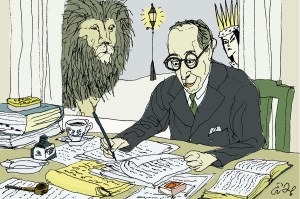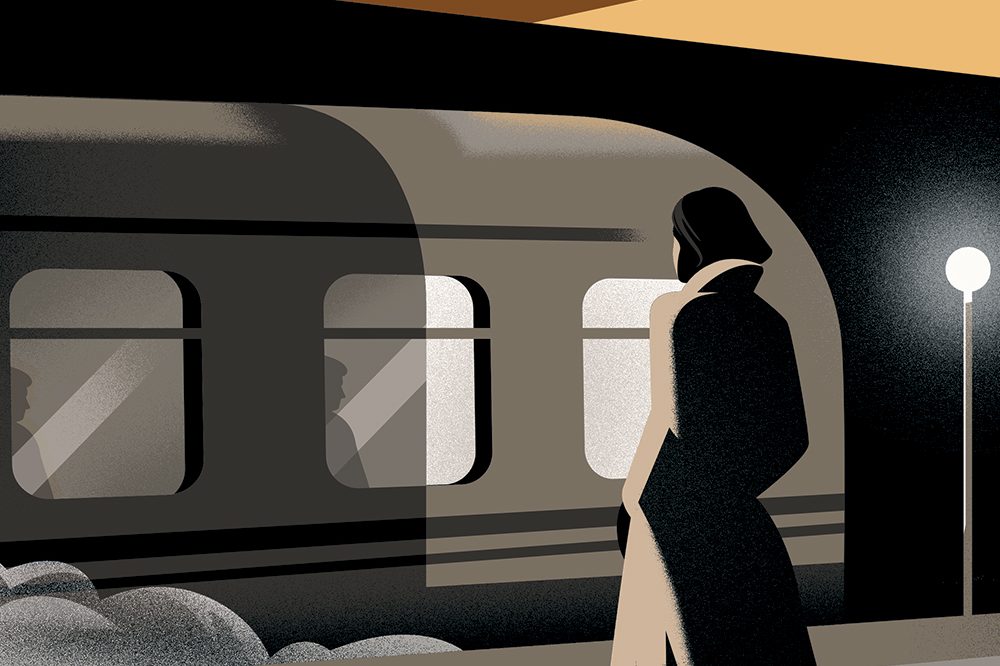Did you read Proust in lockdown? Lockdown, it seemed, offered the eons of vacancy apparently required to finally get around to À La Recherche Du Temps Perdu, aka “The Big One”: a book to be attempted only by the pretentious one percent in the discharge of their services to intellectual snobbery.
I did. I read it twice. I read it because it’s always a pleasure and a novelty, and because I want to get it made as a long-form television series. Proust is perfect for TV: better than anything else, the format can show the passage of time. This is the sine qua non of any Proust reckoning, and it has defeated all attempts so far to make the book into a feature film. We are doing well. The obvious difficulty was finding a screenwriter equal to the task, but he walks amongst us in the dapper form of Rupert Everett: a Proustian, a Francophile, an expert in the manners of the Belle Époque. Everett is gay, like Proust, and a brilliantly clever, funny writer with immaculate comic timing. Like Proust.
Many who haven’t read Proust, and a dismaying number of those who have, don’t realize that his novel is supposed to be funny. It’s not exclusively comedic: there is suffering and betrayal, beauty and cruelty; there is the central investigation into how we redeem our debt to the vanishing years, the dead selves we strew behind us. But this is contained within one of the world’s greatest comedies of manners. A century after his death, it’s finally time that readers got the joke.
We often have to be told things are funny. Hence the canned laughter on TV. At one time, London had a lot of art-house cinemas. You would go and watch something like Buñuel’s Discreet Charm of the Bourgeoisie with an audience chewing on the foyer’s lackluster snacks and watching the screen with expressions of baffled reverence. No one had told us we were expected to laugh. If anyone giggled, they were hushed. I didn’t know Proust’s novel was funny until I read a letter from Nancy Mitford, saying why she preferred it in the original: “in French, one howls!” Then I tried it again, with my settings adjusted for humor, and wondered how I’d failed to notice the comic set-ups, the absurd set-pieces, the fact that the central section has a laugh on every page.
The first rule of explaining jokes is: don’t. But I must commend Proust’s genius for observational satire. The author was the funniest dinner companion in Paris and he made his friends beg for mercy with stories of their social set, exaggerating personal peculiarities, exposing poorly hidden motives, doing the voices, the gestures. Today, we would call it stand-up. When he came to write his great book, he transferred these talents onto the page.
Proust doesn’t winnow out his characters into “comic” and “serious,” as Dickens does. Everyone is up for both serious and satirical treatment, with no discrimination on grounds of sex, age, class, morality or political color. This includes himself, appearing as the character Marcel in the book. His story is of a sentimentally precocious, painfully observant, socially ambitious boy from a well-to-do provincial family. Going out into the world, he meets the various clans that composed France’s then highly discrete and regulated society: the provincials, the nouveaux-riches, the artists, the aristocrats of the Faubourg Saint-Germain and their servants.
In the fifty-odd years of the book’s trajectory, these social tributaries overflow their old courses, merge, plow fresh channels through ancient contours and wholly remake the landscape. The transformative forces at play are great events like the First World War, or the Dreyfus case, that split the country, sucked in political opinions — as Brexit and Trump have done for us — and spat them back transformed.
The character Marcel is not Marcel Proust, but a version of him, refined for his most excruciating characteristics, not unlike Larry David in the television show Curb Your Enthusiasm. The historical Marcel Proust was not ineffectual: he had been in the army and was an energetic producer of essays, articles and reviews. “Marcel,” on the other hand, shares with his maker his poor health and his acute sensibilities, but raised to the point where they overwhelm his capacity to act. “Marcel” is an extreme product of his times — the age of Wilde and Des Esseintes, of snobbery and aestheticism. You might call him an aesthetic nerd.
Permanently sickly and enervated, Marcel neither writes nor works nor fucks the women he is in love with. His erotic tastes run more to masturbation. As for the rest, he’s too busy being ambushed by such alarming entities as an unfamiliar wallpaper in his lodgings to do anything much. Move a cupboard in his room three inches to the left and he retires to bed for the rest of the day. What Marcel does is watch. He’s a spy. All novelists are spies, but Proust was one of the first to make that relation explicit. Marcel sits at windows. If the window is inconveniently situated above a door, he’ll climb on a chair for a better view.
The ultimate beneficiaries of Marcel’s spying activities are his readers. In Proust’s other function as the book’s narrator, with a knowledge of the future that Marcel lacks, he can discern men’s motives: a useful talent in a society almost entirely composed of dissemblers. Proust’s characters don’t operate like those in, say, an Austen novel, where people say what they mean and the humor lies in their ignorance of its effect. In Proust, people say what they don’t mean, and the narrator’s job is to interpret for us, often to comical effect.
For example: the Duc de Guermantes is a snob and a boor but also the acknowledged ruler of Parisian society, along with his witty, crystalline wife, whom everyone wants but him. When Guermantes solemnly laments the Dreyfus case “which has been responsible for so many misfortunes,” he is really thinking of one misfortune only: his failure, owing to related repercussions, to become the president of the Jockey Club.
Or Mme Verdurin, the nouveau-riche salonnière, overlord of her “little band” of invitees, who demands undeviating loyalty and exacts a savage revenge on dissenters. When she calls the aristocrats of the Faubourg St. Germain “those dreadful bores,” what she means is that nothing would excite her more than their presence at her “evenings,” where they would not dream of setting foot. The narrator, at our elbow, keeps up his scathing commentary. It’s party-going with the most intelligent and mischievous gossip on the planet.
As young Marcel begins his journey through the byways of society, he discovers there’s a self-appointed guardian blocking the entrance at every turn. If you are a character in Proust, you have only to let drop that there is something you want — an introduction, a favor, a recommendation — for your interlocutor to try and stop you from having it. Proust is wonderful at animating these stand-offs between petitioner and nemesis. Marcel’s father, for example, is a plain-dealing man, who plans to send his mother-in-law and his son to the seaside town of Balbec. He meets a neighbor, M. Legrandin, and asks him if he knows anybody there. It happens that Legrandin’s own sister is married to a well-connected aristocrat from Balbec, but no earthly force will induce him to divulge this. He affects not to have heard the request.
Marcel’s father persists.
“Have you friends, then, in the neighborhood?” he repeats.
“In a final and desperate effort… [Legrandin] said to us, ‘I have friends wherever there are clusters of trees, stricken but not defeated, which have come together with touching perseverance to offer a common supplication to an inclement sky.’
‘That is not quite what I meant.’”
A society clustered with people who are pretending to be someone else, or to have been, yesterday afternoon, somewhere other than where they actually were, is a rich field for farce. Very often, they are pretending not to be gay. A case in point is the Duc de Châtellerault, one of a quartet of highborn young men known as “the four gigolos” because they are all trying to marry the same two American heiresses. For this reason, it is imperative that Châtellerault’s true sexual proclivities remain secret. One night on the Champs Élysées he picks up an older man for sex. Afterwards, highly satisfied, the stranger asks who he is; and the young Duke, desperate to preserve his anonymity, mutters that he is an Englishman (naturally), and he doesn’t speak French. But a day or so later, Châtellerault goes to a soirée at the Princesse [sic] de Guermantes’, where he meets his pick-up again. The older man turns out to be the princess’s usher, whose job is to announce the guests — and who is now beside himself with pride to learn he had pulled such an eminent personage. After giving his name:
The Duke looked at him, recognized him, saw himself ruined, while the servant, who had recovered his composure… roared with a professional vehemence softened with intimate tenderness: “Son Altesse Monseigneur le duc de Châtelleraut!”
If you need that explained, you probably shouldn’t read Proust. But if you don’t, then surrender to a blissful full-frontal assault on both your funny bone and your higher consciousness.
This article was originally published in The Spectator’s February 2022 World edition.

























